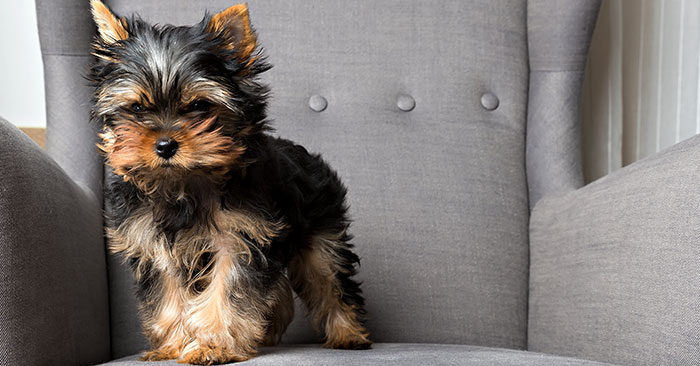Yorkshire Terriers, or Yorkies as they’re affectionately called, are small in size but big in personality. These feisty little pups have a strong character, which means that while they’re incredibly lovable, they also need consistent training from an early age to ensure they grow into well-behaved adults.
If you’ve recently welcomed a Yorkshire Terrier puppy into your home, or are considering doing so, here’s what you need to know about their training.
Understanding Yorkies
Before delving into training, it’s essential to understand the breed. Yorkshire Terriers are intelligent, lively, and often possess a ‘big dog’ mentality, which means they sometimes forget how small they really are!
This characteristic can make them fearless and sometimes overly assertive if not trained properly.
1. Start Early
Begin your Yorkie’s training as soon as they arrive at your home. This means that at 8-10 weeks old, they should already be familiarizing themselves with basic commands such as “sit”, “stay”, and “come”. The earlier you start, the more ingrained these commands will be.
2. Positive Reinforcement
Yorkies respond best to positive reinforcement. This means rewarding them with treats, praise, or playtime whenever they display good behavior. Avoid punishment-based methods, as they can make your pup fearful or aggressive.
3. Socialization is Key
One of the most important aspects of training is socialization. Expose your puppy to different environments, sounds, people, and other animals. This will help them be well-adjusted adults and reduce tendencies like excessive barking or aggression towards other animals.
4. Consistency is Crucial
Yorkies, given their strong-willed nature, require consistent training. If you let them jump on the sofa once, they’ll assume it’s always allowed. Set boundaries early on, and ensure everyone in the household enforces them.
5. Potty Training
Yorkshire Terriers are notorious for being a bit challenging to potty train. However, with patience and consistency, they’ll get the hang of it. Set a regular schedule, take them out first thing in the morning, after meals, and before bedtime.
Always praise them when they do their business outside.
6. Overcoming the ‘Small Dog Syndrome’
Sometimes, small dogs like Yorkies can develop what’s called ‘small dog syndrome’. This refers to a situation where the dog believes they’re the pack leader in the house. To prevent this:
- Always enter or exit rooms before your pup.
- Ensure they know basic obedience commands.
- Avoid over-pampering; treat them like a dog, not a toy.
7. Train Against Excessive Barking
Yorkies are alert and can be quite vocal. It’s essential to train them not to bark excessively. When they start barking, distract them with a command or a toy. If they stop, reward them with a treat.
8. Chew Toy Training
Like all puppies, Yorkies love to chew. Provide them with plenty of appropriate chew toys, and if they start gnawing on something they shouldn’t, replace the item with one of their toys.
Final Thoughts
Training a Yorkshire Terrier puppy requires patience, consistency, and understanding. Remember that every dog is an individual, so what works for one might not work for another.
However, with time and effort, your Yorkie will grow up to be a well-mannered and delightful companion.
FAQs on Yorkshire Terrier Puppies Training
Q: At what age should I start training my Yorkshire Terrier puppy?
A: You can begin basic training as early as 8-10 weeks old. This is a formative period for puppies, and they’re like sponges, ready to soak up knowledge!
Q: My Yorkie is so small! Do they really need training like bigger breeds?
A: Absolutely. Regardless of their size, all dogs benefit from training. It helps with their mental stimulation, ensures they’re well-behaved, and strengthens the bond between owner and pet.
Q: How long should each training session last for a Yorkshire Terrier puppy?
A: Keep training sessions short and sweet, ideally between 5-10 minutes for young puppies. As they age and their attention span increases, you can gradually extend this time.
Q: My Yorkie seems to forget the tricks I teach her. What am I doing wrong?
A: Consistency is key. Ensure you’re practicing the same commands daily. Additionally, positive reinforcement works wonders. Reward her each time she gets it right, and she’ll likely remember better.
Q: Are Yorkies hard to potty train?
A: Yorkies can be a bit challenging to potty train compared to some other breeds, but with consistency, patience, and a regular schedule, they’ll get the hang of it.
Q: My Yorkshire Terrier barks at everything! How do I train him to be quieter?
A: Yorkies are naturally alert. Begin by identifying what triggers the barking. Distraction techniques, like offering a toy or command, can help. Consistent training and positive reinforcement when they stay quiet will also be beneficial.
Q: How do I socialize my Yorkie with bigger dogs?
A: Start by exposing them to calm and well-behaved larger dogs under controlled circumstances. Always supervise their interactions and ensure that playtime doesn’t get too rough. Over time, your Yorkie will become more confident around larger dogs.
Q: Are group training classes suitable for Yorkshire Terrier puppies?
A: Yes, group classes can be great for socialization and learning basic commands. However, ensure the class is conducted by a professional trainer and that there’s a mix of different breeds and sizes for the best socialization experience.
Q: My Yorkie keeps chewing my shoes! How can I redirect this behavior?
A: Puppies, including Yorkies, love to explore the world with their mouths. Provide them with a variety of chew toys. When you catch your pup chewing something inappropriate, replace it with one of their toys and praise them when they chew on the correct item.
Q: How can I ensure my Yorkshire Terrier views me as the pack leader?
A: Establishing dominance (in a kind way) is crucial. Simple actions like making sure you enter rooms before your Yorkie, initiating and ending play sessions, and ensuring they follow basic commands can help establish you as the pack leader.



